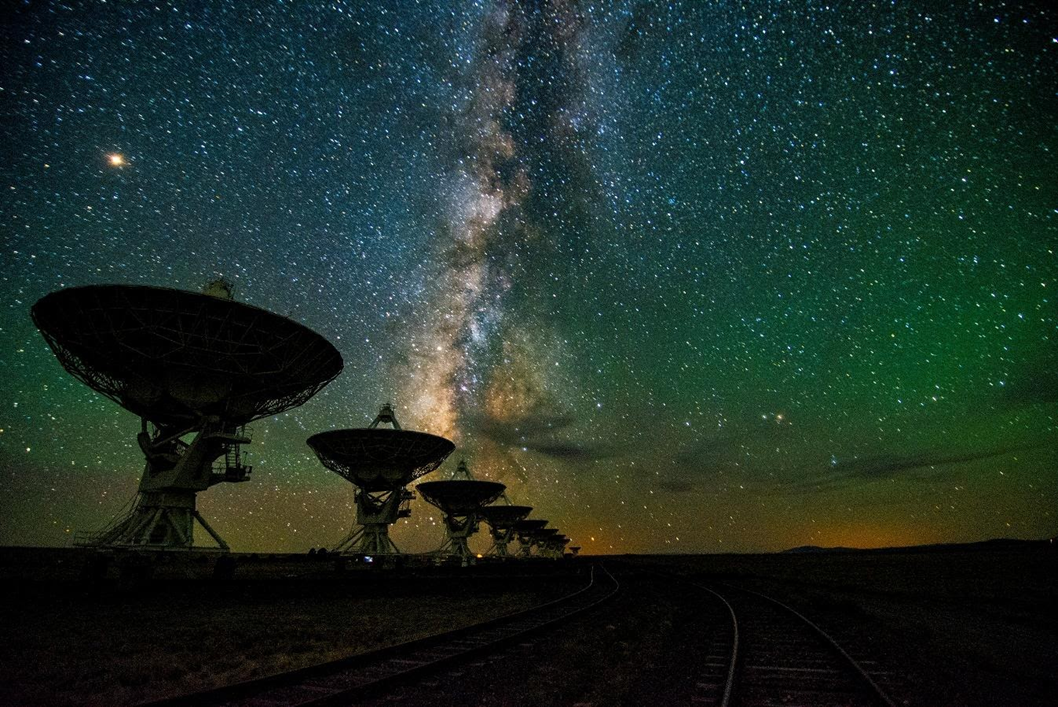The VOLS survey is granted 306 observing hours to study the cloud Orion A

The international team of astronomers is led by the IEEC researcher at the Institute of Cosmos Sciences of the University of Barcelona (ICCUB) Gemma Busquet.
Other IEEC researchers from ICCUB and from the Institute of Space Sciences (ICE-CSIC) have also participated in the study.
An international team of astronomers led by the researcher of the Institute of Space Studies of Catalonia (IEEC – Institut d'Estudis Espacials de Catalunya) at the Institute of Cosmos Sciences of the University of Barcelona (ICCUB) Gemma Busquet have been granted 306 observation hours for their project “VOLS: The VLA Orion A Large Survey”. This survey will observe the northern region of the molecular cloud Orion A using the Karl G. Jansky Very Large Array Telescope (VLA), a component of the National Radio Astronomy Observatory (NRAO) located in New Mexico (USA).
The goal is to build a census of the stellar population, characterize their radio emission and quantify their rates of mass loss and mass accretion. The project counts with the participation of 46 researchers around the globe, including several IEEC researchers at ICCUB and at the Institute of Space Sciences (ICE, CSIC).

From left to right: Gemma Busquet (ICCUB-IEEC), Josep Miquel Girart (ICE-CSIC, IEEC), Rosario López (ICCUB-IEEC), Robert Estalella (ICCUB-IEEC), Bo Huang (ICE-CSIC) and Chema Torrelles (ICE-CSIC, IEEC) / Credits: ICCUB
The main goal of this survey is to study the evolution of young stellar objects (YSOs) and protostars (which are the earliest phases of the life of a star) to determine the properties of stars and planetary systems.
The early stages of star and planet formation involve a balance between accretion (mass fallen into the star from the stellar disk) and ejection of material (ejected from the star) in gravitational collapse. This balance and the consequent protostellar evolution are crucial in determining the final properties of stars and their planetary systems.
In this context, both mass-accretion rate and mass-loss rate are fundamental, albeit still uncertain, quantities in star formation. The team proposes the VOLS project to investigate how these rates vary with protostellar evolution, and how they depend on the initial conditions (i.e., the environment) and on the mass of the star.
To answer these questions, the team will use the VLA Telescope to observe the northern part of the molecular cloud Orion A, covering an area of approximately 0,5 deg2 (which is roughly four times the size of the moon in the sky). Orion A is the nearest star-forming complex containing a broad range of environments populated by protostars and YSOs with different masses and evolutionary stages, representing a testbed for star formation theories.
The observations will focus on two radio frequency bands. This will be the first radio study to cover a large area of Orion A at subarcsecond resolution, improving the sensitivity by a factor of 20 compared to previous large-scale surveys in Orion.
Together with previous datasets, such as Gaia DR3, VOLS will provide the ultimate correlation between the characteristics of the radio emission from YSOs and their properties. This project is crucial for the next generation of centimetric interferometers such as the Square Kilometer Array (SKA) or the Next-generation Very Large Array (ngVLA) since it will provide a radio template of YSOs and protostars.
Press release made in collaboration with ICCUB and ICE Communication Offices.
Links
– IEEC
– ICCUB
– ICE
– Very Large Array (VLA)
More information
The Institute of Space Studies of Catalonia (IEEC — Institut d’Estudis Espacials de Catalunya) promotes and coordinates space research and technology development in Catalonia for the benefit of society. IEEC fosters collaborations both locally and worldwide and is an efficient agent of knowledge, innovation and technology transfer. As a result of 25 years of high-quality research, done in collaboration with major international organisations, IEEC ranks among the best international research centers, focusing on areas such as: astrophysics, cosmology, planetary science, and Earth Observation. IEEC’s engineering division develops instrumentation for ground- and space-based projects, and has extensive experience in working with private or public organisations from the aerospace and other innovation sectors.
IEEC is a private non-profit foundation, governed by a Board of Trustees composed of Generalitat de Catalunya and four other institutions that each have a research unit, which together constitute the core of IEEC R&D activity: the Universitat de Barcelona (UB) with the research unit ICCUB — Institute of Cosmos Sciences; the Universitat Autònoma de Barcelona (UAB) with the research unit CERES — Center of Space Studies and Research; the Universitat Politècnica de Catalunya · BarcelonaTech (UPC) with the research unit CTE — Research Group in Space Sciences and Technologies; the Spanish Research Council (CSIC) with the research unit ICE — Institute of Space Sciences. IEEC is a CERCA (Centres de Recerca de Catalunya) center.
Contacts
IEEC Communication Office
Barcelona, Spain
Ana Montaner and Sònia Bagudanch
E-mail: comunicacio@ieec.cat
Lead Researcher
Institut d’Estudis Espacials de Catalunya (IEE)
Institute of Cosmos Sciences of the University of Barcelona (ICCUB)
Barcelona, Spain
Gemma Busquet
E-mail: busquet@ieec.cat, gbusquet@icc.ub.edu
